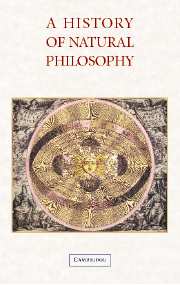Book contents
- Frontmatter
- Contents
- Preface
- 1 Ancient Egypt to Plato
- 2 Aristotle (384–322 BC)
- 3 Late Antiquity
- 4 Islam and the Eastward Shift of Aristotelian Natural Philosophy
- 5 Natural Philosophy before the Latin Translations
- 6 Translations in the Twelfth and Thirteenth Centuries
- 7 Natural Philosophy after the Translations: Its Role and Place in the Late Middle Ages
- 8 The Form and Content of Late Medieval Natural Philosophy
- 9 The Relations between Natural Philosophy and Theology
- 10 The Transformation of Medieval Natural Philosophy from the Early Modern Period to the End of the Nineteenth Century
- Conclusion
- Bibliography
- Index
10 - The Transformation of Medieval Natural Philosophy from the Early Modern Period to the End of the Nineteenth Century
Published online by Cambridge University Press: 05 June 2012
- Frontmatter
- Contents
- Preface
- 1 Ancient Egypt to Plato
- 2 Aristotle (384–322 BC)
- 3 Late Antiquity
- 4 Islam and the Eastward Shift of Aristotelian Natural Philosophy
- 5 Natural Philosophy before the Latin Translations
- 6 Translations in the Twelfth and Thirteenth Centuries
- 7 Natural Philosophy after the Translations: Its Role and Place in the Late Middle Ages
- 8 The Form and Content of Late Medieval Natural Philosophy
- 9 The Relations between Natural Philosophy and Theology
- 10 The Transformation of Medieval Natural Philosophy from the Early Modern Period to the End of the Nineteenth Century
- Conclusion
- Bibliography
- Index
Summary
From its high point in the in the fourteenth century, medieval natural philosophy underwent significant changes in the course of the sixteenth and seventeenth centuries. But just as important as the changes that occurred directly to medieval natural philosophy are the changes that significantly altered almost everything around it. By the seventeenth century, Western Europe had undergone a great transformation from what it had been like in the fourteenth century. Beginning with Gutenberg's invention of the printing press around 1450, followed by Columbus's voyage to America in 1492, and, in the seventeenth century, the inventions of the microscope and telescope, the world in which Aristotle's natural philosophy was developed and nurtured had largely vanished. No doubt other factors of change might be cited, but one that also must be mentioned is the Protestant Reformation, which directly challenged the Catholic Church and therefore the culture within which Aristotle's natural philosophy had flourished. Aristotle's dominance in natural philosophy during the late Middle Ages is partially, if not largely, explicable by the fact that until the first half of the fifteenth century, Aristotelian natural philosophy had no rivals. From the mid-fifteenth century on, this began to change dramatically, as Greek works previously ignored or unknown were translated into Latin and vernacular languages and began to have an impact. Soon rival philosophies emerged among which were Platonism, Atomism, Stoicism, Neoplatonism, Hermeticism, and Copernicanism.
- Type
- Chapter
- Information
- A History of Natural PhilosophyFrom the Ancient World to the Nineteenth Century, pp. 274 - 322Publisher: Cambridge University PressPrint publication year: 2007



